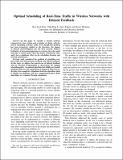Optimal scheduling of real-time traffic in wireless networks with delayed feedback
Author(s)
Kim, Kyu Seob; Li, Chih Ping; Kadota, Igor; Modiano, Eytan H
DownloadAllerton2015 copy.pdf (621.1Kb)
OPEN_ACCESS_POLICY
Open Access Policy
Creative Commons Attribution-Noncommercial-Share Alike
Terms of use
Metadata
Show full item recordAbstract
In this paper we consider a wireless network composed of a base station and a number of clients, with the goal of scheduling real-time traffic. Even though this problem has been extensively studied in the literature, the impact of delayed acknowledgment has not been assessed. Delayed feedback is of increasing importance in systems where the round trip delay is much greater than the packet transmission time, and it has a significant effect on the scheduling decisions and network performance. Previous work considered the problem of scheduling real-time traffic with instantaneous feedback and without feedback. In this work, we address the general case of delayed feedback and use Dynamic Programming to characterize the optimal scheduling policy. An optimal algorithm that fulfills any feasible minimum delivery ratio requirements is proposed. Moreover, we develop a low-complexity suboptimal heuristic algorithm which is suitable for platforms with low computational power. Both algorithms are evaluated through simulations.
Date issued
2016-04Department
Massachusetts Institute of Technology. Department of Aeronautics and Astronautics; Massachusetts Institute of Technology. Department of Electrical Engineering and Computer ScienceJournal
2015 53rd Annual Allerton Conference on Communication, Control, and Computing (Allerton)
Publisher
Institute of Electrical and Electronics Engineers (IEEE)
Citation
Kim, Kyu Seob, Chih-Ping Li, Igor Kadota, and Eytan Modiano. “Optimal Scheduling of Real-Time Traffic in Wireless Networks with Delayed Feedback.” 2015 53rd Annual Allerton Conference on Communication, Control, and Computing (Allerton) (September 2015), Monticello, IL, USA, Institute of Electrical and Electronics Engineers (IEEE), 2015.
Version: Author's final manuscript
ISBN
978-1-5090-1824-6